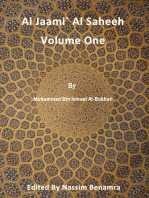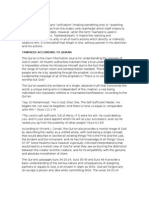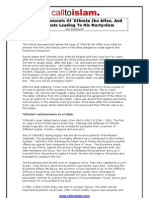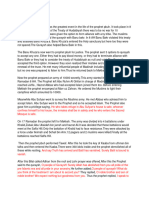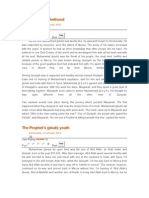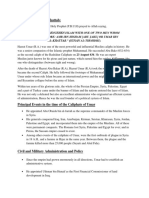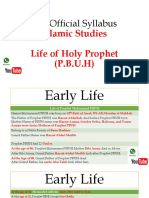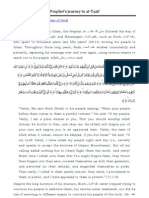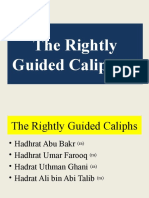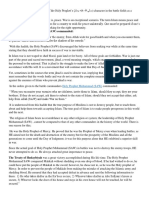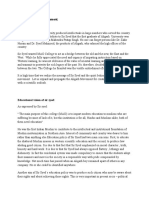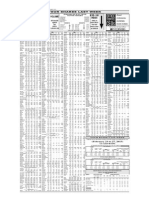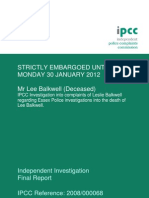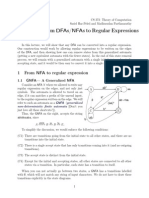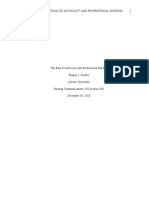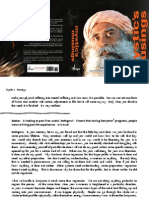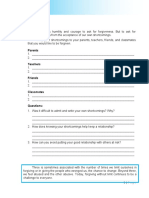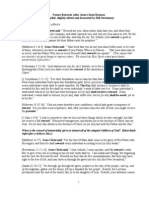Hazrat Abu Bakar
Hazrat Abu Bakar
Uploaded by
BencAoDeDeusCopyright:
Available Formats
Hazrat Abu Bakar
Hazrat Abu Bakar
Uploaded by
BencAoDeDeusOriginal Description:
Copyright
Available Formats
Share this document
Did you find this document useful?
Is this content inappropriate?
Copyright:
Available Formats
Hazrat Abu Bakar
Hazrat Abu Bakar
Uploaded by
BencAoDeDeusCopyright:
Available Formats
HAZRAT ABU BAKR SIDDIQUE (RA) - 1ST
CALIPH
Hits: 1733
"No one has been a better companion to me than Abu Bakr (RA)," said the Holy
Prophet SAW in his last sermon.
A great reward indeed! Abu Bakr (RA) had earned it. All his life he stood by the side of
the Prophet SAW. He did not care for his life. He did not care for his riches. He did not
care for what others said about him. His only ambition was to serve the Prophet SAW
more than anyone else. The cost did not matter. The ambition was fulfilled. And Abu
Bakr (RA) got his reward in full. The Messenger of Allah SAW was well pleased with
him. He gave him the first place among the Companions. Abu Bakr (RA) was to be the
first man to fill the place of the Prophet SAW. He was also to lie in eternal rest by the
prophet's side.
Service to the Prophet - First among Men
Abu Bakr (RA) was always very close to the Holy Prophet SAW. He knew him better
than any other man. He knew how honest and upright his friend had always been. So
he was the first among men to believe in the Prophet's mission. He was the first adult
male to accept Islam. After the first revelation, the Holy Prophet SAW told him what had
happened at Mount Hira. He told him that Allah had made him His Messenger. Abu
Bakr (RA) did not stop to think. He at once became a Muslim. Once the holy Prophet
himself remarked, "I called people to Islam. Everybody thought over it, at least for a
while. But this was not the case with Abu Bakr (RA). The moment I put Islam before
him, he accepted it without any hesitation."
The Holy Prophet SAW called at Abu Bakr (RA)'s house every day. The two sat down
and thought out ways of spreading Islam. Together they went to people and places and
delivered the message of Allah. Wherever the Holy Prophet SAW went, Abu Bakr (RA)
went with him.
Risks His Life
One day the Holy Prophet SAW was saying his prayers in the Kaaba. He was totally lost
in the thoughts of Allah. Abu Jahl and some other chiefs of Mecca were sitting in the
courtyard of the Kaaba. "I must finish with Muhammad today," said Abu Jahl. So saying,
he took a long piece of cloth. He put it around the Holy Prophet SAW's neck. Then he
twisted it hard. He was going to strangle the Messenger of Allah to death. The other
chiefs looked on and laughed.
Abu Bakr (RA) happened to see this from a distance. He at once ran to the help of the
Prophet SAW. He pushed Abu Jahl aside and took off the cloth from around the Holy
Prophet SAW's neck. Thereupon Abu Jahl and other enemies of Islam came down upon
Abu Bakr (RA). They beat him very much. Indeed, the beating was so severe that Abu
Bakr (RA) fell down senseless. He was carried home. He could not regain his senses till
after several hours. And when he did come to himself, the first question he asked was,
"Is the Prophet un-hurt?" Abu Bakr (RA) did not care for his own suffering. He was glad
that he was able to help save the Prophet's life. Abu Bakr (RA) knew full well that if any
harm came to the Prophet SAW, the only hope of mankind would be gone. This made
him risk everything he held dear, for the safety of the Prophet SAW and for the spread
of his message.
The Title of "Siddiq"
In the tenth year of his mission, the Holy Prophet SAW had the Miraj or Ascension. One
night the angel Gabriel AS came with the word that Allah the Almighty wanted the Holy
Prophet SAW to come all the way up to the highest heaven. The Holy Prophet SAW
undertook the journey.
In the morning, after the ascension had taken place, the Holy Prophet SAW talked to
people about the Miraj. This drew the jeers of his enemies.
"Look!" they howled out, "what nonsense he talks! Surely, now his followers too will
laugh at him. Who is going to believe in such a midsummer night dream?"
The talk was going on when Abu Bakr (RA) came up. "Do you know, Abu Bakr (RA),
what news your friend has for you in the morning?" said one of the mean. "He says he
was on the highest heaven last night, having a talk with Allah, the Almighty. Would you
believe it?"
"I would believe anything that the Messenger of Allah says," replied Abu Bakr (RA)
When the Holy Prophet SAW learnt of this, he at once said, "Abu Bakr (RA) is the
`Siddiq'." `Siddiq' is a person so sincere of heart that doubts never mar his love. Abu
Bakr (RA) earned this title because of his faith was too strong to be shaken by anything.
Migration to Medina
W hen the Meccans were intent on putting out, once and for all, the light of Islam, Allah
commanded the Holy Prophet SAW to move to Medina. In the burning heat of the
midday sun, there was a knock at Abu Bakr (RA)'s door. He ran to the door and found
the Messenger of Allah SAW standing outside. "I must leave for Medina tonight," said
he.
"Will I also have the honour of going with you?" asked Abu Bakr (RA) eagerly.
"Of course," came the reply. "Set about getting things ready."
Abu Bakr (RA) was beside himself with joy. "I have been looking forward to this day for
months," he exlaimed. "I have specifically kept two camels to carry us to Medina."
It was Abu Bakr (RA) who made all the arrangements for the historic journey. for three
days he and the Prophet SAW lay hidden in the Thaur cave. Abu Bakr (RA)'s slave
tended the flocks of goats near the cave all day and supplied them fresh milk for food.
His son, Abdullah, brought news about what the Meccans were doing.
The Meccans were searching for the Holy Prophet SAW like mad hounds. Once they
came right to the mouth of the cave. Abu Bakr (RA) grew pale with fright. He feared, not
for himself, but for the Prophet SAW. However, the Holy Prophet SAW remained
perfectly calm. "Do not fear," he said to Abu Bakr (RA), "certainly Allah is with us."
Of all the companions, Abu Bakr (RA) had the honour of being with the Prophet during
the most critical days of his life. Abu Bakr (RA) knew full well what this honour meant.
And he did full justice to the trust put in him.
Agent to the Prophet SAW
The first Hajj under Islam fell in the ninth year of Hijra. The holy Prophet SAW was too
busy at Medina to lead the Hajj himself. So he sent Abu Bakr (RA) as his agent. He was
to lead the Hajj in place of the Prophet SAW. Ali RA was also sent with Abu Bakr (RA).
Abu Bakr (RA) read the Khutba (Sermon) of Hajj. Then Ali RA stood up and read out to
the people the commandments of Allah concerning the idol worshippers. From that year
on, they were forbidden to enter the Kaaba.
Ever since he came to Medina, the holy Prophet SAW himself led prayers in the
Prophet SAW's Mosque. It was an unusually high office which the Messenger of Allah
himself filled. During his last illness, the holy Prophet SAW could no longer lead
prayers. He grew too weak to go to the mosque. He had to appoint someone to act in
his place. This honour also fell to the lot of Abu Bakr (RA). Aisha RA, who was Abu Bakr
(RA)'s daughter and a wife of the holy Prophet SAW, thought that the burden was too
much for her tender-hearted father. She pleaded with the holy Prophet SAW to excuse
her father from this duty. But the holy Prophet SAW did not change his mind.
Thus in the lifetime of the holy Prophet SAW Abu Bakr (RA) came to fill the highest
office under Islam. One day Abu Bakr (RA) was away on some business and Umar RA
led the prayer in his absence. "This is not Abu Bakr (RA)'s voice," remarked the ailing
Messenger of Allah. "No one but he should lead prayers. He is the fittest person for this
high office."
On the last day of his life, the condition of the holy Prophet SAW became suddenly
better for a while. It was early morning. Abu Bakr (RA) was leading the prayer in the
mosque. The holy Prophet SAW lifted the curtain of his door and fixed his gaze on the
worshippers. They were busy in prayer under Abu Bakr (RA)'s leadership. A smile lit up
on the pale face of the holy Prophet SAW. He let go of the curtain. But he was happy at
the thought that he had chosen the best man to fill his place.
It was through these qualities and also the pledge of loyalty that the Sahaba showed
towards Abu Bakr (RA) he became the 1st Caliph by the general consent of the people.
Abu Bakr (RA) Passes Away
After an illness of two weeks, Abu Bakr (RA) passed away. He was sixty-three at the
time. He was buried by the side of the Holy Prophet SAW.
Before his death he said, "Do not use new cloth to cover my dead body. The sheet of
cloth I have on will do for me. Wash it clean."
"But this is too old and worn, father," said his daughter Aisha RA.
"This old and worn sheet will do for me," he replied.
On the 22nd of Jamadi-ul-Akhir, 13 A.H., Abu Bakr (RA) was taken ill. He had severe
fever. Everything was done to bring down the fever, but all in vain. It became clear to
the aged Caliph that his end had come.
Two Years of Abu Bakr (RA)'s Calpihate
Abu Bakr (RA) was Caliph for only two years, three months and ten days. This was a
relatively short period of time in the life of people. But during this short period, Abu Bakr
(RA) was able to do great things for Islam. These achievements have made his name
immortal. They have placed him among the greatest men of all time.
When Abu Bakr (RA) took over, Islam was confined to Arabia alone. And here, too its
hold was rather shaky. In many parts of the country, Islam was but a name. It was not a
way of life with most people. Scores of tribes had thought of the Holy Prophet SAW has
a mere king. They tried to throw off his yoke as soon as he was no more. Abu Bakr (RA)
taught these people a lasting lesson. He taught them that Islam was a way of life.
Abu Bakr (RA) was able to do this because of his unshakable faith. No difficulties could
take him off the path of the Prophet SAW. Usama RA might be youthful and
inexperienced, but Abu Bakr (RA) would not hear a word against him. He was appointed
by the Prophet SAW. There might be rising in the country, but Abu Bakr (RA) would not
put off the expedition to Tabuk. The Prophet SAW had ordered it. Abu Bakr (RA) stood
unequalled in his love for Allah and His Apostle SAW. This was the secret of his
unbending strength. It was this inner strength that carried him through the darkest hours
of his Caliphate.
Abu Bakr (RA) was as sincere as he was firm in faith. He lived up to every word of what
he said at the beginning of his Caliphate. He was never anything but the faithful agent of
Allah and His Apostle, and the humblest servant of his people. It was this fact which
won him the deepest love and respect for all classes of his people. The result was that
Islam took an unshakable hold on the country of its birth. Soon it gathered enough
strength to overlap its boundaries. It struck at the two most feared powers of the time.
And lo! it was successful. Abu Bakr (RA) had put Islam on the road to worldwide
expansion.
Islam means total submission to the will of Allah. It means that utter absence of all
selfishness. The Holy Prophet SAW showed by his example how that goal could be
reached. He SAW showed how the power of the State should not be used for private
ends but for the public good. Abu Bakr (RA) was the first among his followers to live up
to the Prophet SAW's example. He got no personal gain out of the Caliphate. He spent
every minute of the last two years of life in the service of his people, but got not a penny
as wages.
Abu Bakr (RA) had several sons and many near relatives. For public offices, he did not
choose anyone of them. He rather chose other people who were more fit for public
service. He had to nominate his own successor to prevent quarrels. But his choice fell
on none of his own relatives. His choice was rather the man whom he honestly believed
to be the best among the Companions. All the same, he did not force his choice on
people. He put his proposal before the Companions. When they had agreed to it, he put
it before the people.
In short, Abu Bakr (RA) showed the world what government of the people, for the
people, and by the people really meant. Neither the East nor the West had ever known
such a form of government before. The mighty empires of Iran and Byzantium were
based upon naked force.
In short Abu Bakr (RA) kept going the great work of the Prophet SAW. For that he had
to fight hard. He fought with a will and with a faith that amazed everyone. Islam is
forever grateful to him for the great services he rendered to it.
Oh Allah continue to raise the rank of Hazrat Abu Bakr RA and let us be amongst his
party on the day of Resurrection. Ameen
The Holy Prophet (Sallallahu 'alaihi wa Sallam) did not nominate his successor and left the choice of his
deputy or viceroy (Khalifah) to his Ummah (followers). There were two groups of Muslims in Medina viz.,
Muhajirin (the Immigrants from Mecca), and Ansar (Helpers i.e., Medinites). After the death of the Holy
Prophet (Sallallahu alaihi wa Sallam), Ansar (Medinites) gathered in a big Hall of Medinah known as
"Saqifah-i-Bani Sa'idah" to discuss the appointment of a Khalifah. Hadrat Abu Bakr and Hadrat Umar with
other prominent Muhajirin (Immigrants) were in the Mosque. When they were informed about the
gathering of Ansar, Hadrat Abu Bakr and Umar also went there accompanied by a number of eminent
Muhajirin like Hadrat Abu 'Ubaidah bin al-Jarrah. Since Hadrat 'Ali and Hadrat Zubair (two prominent
figures among Muhajirin) were not present at the spot, they could not go to the gathering.
Much discussion was going on in the gathering of the Ansar about the selection of a Khalifah. Some of
the leading Ansar wanted a Khalifah from amongst the Ansar. When Hadrat Abu Bakr heard it, he said.
"We acknowledge the sacrifices of Ansar for Islam. You really deserve to have a Khalifah from amongst
yourselves, but Arabs will not agree on any "Amir" (Chief of other than a person from the Quraish."
Hearing Hadrat Abu Bakr another Ansari, Khabab bin Mundhar stood up and said, "Let there be two
Amirs (Khalifahs) then, one from amongst Quraish and another from amongst Ansar." On this Hadrat
Umar stood up and said, "This is not at all possible. There would be great confusion because of two
Amirs." Hadrat Khabbab bin Mundhar did not agree with Umar and there was a hot talk between them.
Hadrat Abu 'Ubaidah tried to cool them down. Then another Ansari Hadrat Bashir bin an-Nu'man (R.A.)
stood up and said, "The Holy Prophet belonged to the Quraish tribe. Quraishites have preference over
others. All the Arabs would agree on them. Therefore a Khalifah must be from amongst them. We do not
want any dispute with Muhajirin in the matter of Khilafat. We the Medinites are Ansar (Helpers) and we
would prefer to remain Helpers of Allah and His Holy Prophet (Sallaliahu'alaihi wa Sallam)." Another
Ansari Hadrat Zaid bin Thabit (R.A.) also supported this view and said, "There should be a Khalifah from
amongst Muhajirin (Quraishis). We Medinites were Ansar (Helpers) of the Holy Prophet (Sallallahu 'alaihi
wa Sallam) and would remain Ansar (Helpers) of his Khalifah as well." A number of Ansar then supported
this view, and there was general satisfaction in the council over the selection of a Muhajir (Quraishi)
Khalifah. Seeing this Hadrat Abu Bakr (R.A.) stood up and said, "I propose the name of Umar and
Abu'Ubaidah bin al-Jarrah for this post. Select anyone of these two men as your Khalifah." But both of
them refused and Hadrat Umar said, "Abu Bakr is the best of all of us because Allah has mentioned him
in the Holy Qur'an saying: "The one amongst two in the cave" (9:40). He further said, Abu Bakr excelled
at every occasion during the life of the Holy Prophet (Sallallahu 'alaihi wa Sallam). He deputised the Holy
Prophet (Sallallahu 'alaihi wa Sallam) in leading Salats, he was appointed the Chief of Haj caravan. As
such he is the fittest person to be the Khalifah." Hadrat Abu Bakr still hesitated but Umar (R.A.) and
Hadrat Zaid bin Thabit Ansari held his hand and took pledge of loyalty (Bai'at). Then Hadrat Abu 'Ubaidah
bin al-Jarrah and Hadrat Bashir bin an-Nu'man Ansari also took pledge of loyalty at his hands. Seeing this
people from all the sides rushed to pledge loyalty to Abu Bakr (R.A.) as the first successor of the Holy
Prophet (Sallallahu'alaihi wa Sallam).
Next day a general pledge of loyalty (Bai'at) was taken by the Muslims in the Mosque of the Holy Prophet
(Sallallahu 'alaihi wa Sallam). Thus Hadrat Abu Bakr assumed the greatest office, after the office of
prophethood, and became the first Khalifah of Islam. He gave his first address as a Khalifah in the
mosque after the general "Bai'at""0 people! I have been selected as your Trustee although I am no better
than anyone of you. If I am right, obey me. If I am misguided, set me right. Of course truth is honesty and
a lie is dishonesty. The weakest among you is powerful in my eyes until I do not get him his due, Insha-
Allah (If it should please Allah). The most powerful among you is the weakest in my eyes until I do not
make him pay due rights to others Insha Allah. Allah sends down disgrace on those people who give up
Jihad in the path of Allah. Allah surely sends down calamities on such people who indulge in evils.
"I ask you to obey me as long as I obey Allah and His Messenger (Sallallahu 'alaihi wa Sallam). If I
disobey Allah and His Messenger you are free to disobey me. Now come and offer Salat."
In his short address, Hadrat Abu Bakr showed the role of an exemplary Khalifah of Islamic Government.
No doubt Islamic Government means: "Government of Allah and His Prophet, by His obedient servants
for the benefit of the people in this world and in the Hereafter."
About thirty three thousand people took pledge of loyalty (Bai'at) at the hand of Hadrat Abu Bakr in the
mosque. The selection (or Election) of Hadrat Abu Bakr is a pointer towards Islamic Democracy and
furnishes example for selection of a Leader for Ummat-i-Muslimah (Muslim Community) till the Day of
Judgement.
Hadrat Ali took pledge of loyalty a few months later because he was busy in collecting various parts of
the Holy Qur'an. Some other reasons have also been given for his delay in "Bai'at'' which are ignored
here.
Problems faced by Hadrat Abu Bakr As-Siddiq as a Caliph
After the death of the Holy Prophet (Sallallahu 'alaihi wa Sallam), the Arabs were on all sides rising in
rebellion. Apostasy and disaffection raised their heads. Christians and Jews were filled with unrest. Some
Muslim tribes refused to pay Zakat to the Caliph for "Baitul Mal" (the Public Treasury). Some disbelievers
declared themselves to be prophets. There were many problems and much confusion. Hadrat Abu Bakr
(R.A.) faced all these with unparalleled courage and the highest degree of Iman (Faith) which is the
characteristic of a "SIDDIQ". At this place I would like to point out that "SIDDIQIAT" is the highest stage of
Iman (Faith) and "Tawakkul" (Trust in Allah) after prophethood as pointed out in the following verse of the
Holy Qur'an
"All those who obey Allah and the Prophet are in the company of those upon whom Allah has shown
favours - of the Prophets, "Siddiqin" (The Sincere), "Shuhada" (The Martyrs), and "Salihin"(The Righteous
Muslims): Ah! What a beautiful company." (4:69).
In the following lines I would like to mention the main problems faced by Abu Bakr as-Siddiq (R.A.) in
brief.
Usamah's Expedition
The freed slave of the Holy Prophet (Sallallahu 'alaihi wa Sallam) and his adopted son, Hadrat Zaid bin
Harith (R.A.) was martyred at the hands of Syrians (Romans) at Mautah in 8 A.H. A few weeks before his
death the Holy Prophet (Sallallahu 'alaihi wa Sallam) appointed Hadrat Usamah (R.A.), the son of Zaid to
lead an expedition against Syrians in order to avenge the death of his father, Zaid. When Hadrat Usamah
was about to leave, the news of the demise of the Holy Prophet (Sallallahu 'alaihi wa Sallam) came and
the departure of the army was postponed. After being chosen as Caliph, the first task before Abu Bakr
(R.A.) was to send out this expedition. As a matter of fact, it was the most critical time in the history of
Islam. The entire peninsula was in a state of unrest and disorder. Some of the new converts thought
Islam would come to an end with the Holy Prophet's life. Many of the tribes had entered the fold of Islam
only a short time before and were not firm in Islam. About this the Holy Qur'an has already predicted
"The wandering Arabs (Bedouins) say: We have (firm) faith. Say (to them O Muhammad): You believe not
(firmly), but rather say "We submit", for the Faith has not entered into your hearts." (39:14).
At the same time news came to Medina that apostates under the command of some false prophet were
planning to invade the town. Hadrat Abu Bakr(R.A.) was really facing a difficult situation. In the
circumstances, the companions approached him to withdraw the expedition of Hadrat Usamah bin Zaid.
In their opinion it was unwise to send troops out of Medina because they were needed at home.
Here was the test of Abu Bakr's (R.A.) faith in following the ways of the Holy Prophet (Sallallahu 'alaihi wa
Sallam). He got through in his test and proved to be the most firm among all of his companions including
Hadrat Umar. Abu Bakr (R.A.) said he could never alter the decision taken by his master (the Holy
Prophet). He firmly replied to his companions, "How can I fold up the flag which was unfurled by the Holy
Prophet (Sallallahu'alaihi wa Sallam) himself?" When Muslims saw that Hadrat Abu Bakr was firm they
requested him to change the command of Hadrat Usamah because he was too young and inexperienced
-- not yet twenty, thus was not fit to lead the expedition. Hearing this Hadrat Abu Bakr was much annoyed
and said, "Do you want me to dismiss a man appointed by the Messenger of Allah?"
At last the army led by Hadrat Usamah left after three weeks of Holy Prophet's death. Hadrat Umar (R.A.)
was also included in the army. Hadrat Abu Bakr sought Usamah's permission to leave him in Medinah,
and he agreed. Hadrat Abu Bakr himself bid him farewell and went to some distance out of Medina. The
young commander of the army was riding a horse and the great Caliph was walking by his side. After
forty days Hadrat Usamah returned to Medinah with a great victory, the victory of Abu Bakr's (R.A.) firm
Faith.
The success of Usamah's expedition also opened the eyes of those who thought Islam was dying out
after the demise of the Holy Prophet (Sallallahu 'alaihi wa Sallam). Some of the tribes again came back to
Islam which they had left.
Illness of Hadrat Abu Bakr and Umar's Nomination
It was the 7th Jamada-ul-Akhira, 13 A.H. that As-Siddiq al-Akbar fell ill. He had a severe fever. When the
illness took a serious turn he called the "Shura" (Advisory Council) to consult about his successor, the
second Caliph. Since he had seen some confusion after the demise of the Holy Prophet for the selection
of a Caliph, he preferred to let the Muslims decide the matter in his presence. Following were the leading
figures present in the Shura:Umar, 'Uthman,'Ali, 'Abdur-Rahman bin 'Auf, Mu'adh bin Jabal, Ubaiy bin
Ka'b, Zaid bin Thabit (Ridwanullah 'alaihim Ajma'in) and other leading Muhajirin and Ansar. According to
some historians he first consulted some of the most prominent Companions before calling the meeting of
the General Shura about this. Among these persons were 'Uthman,'Abdur rahman bin 'Auf and Usaid bin
hadir etc. (R.A.) Hadrat Abu Bakr put his proposal for Hadrat Umar to be the second Caliph. All of them
agreed with the proposal except for an objection by some of the Companions about his strictness. That
was the only ground on which Hadrat'Ali and Talha (R.A.) also did not agree with Hadrat Abu Bakr. But
Abu Bakr(R.A.) rejected their plea on the ground that the burden of Caliphate would make him milder.
Since there was no opposition to Hadrat Abu Bakr's view, Hadrat Umar was declared to be the next
Caliph and all the Companions, including Hadrat'Ali and Hadrat Talha, agreed to it.
At this point I would like to point out that the decision of Hadrat Abu Bakr (R.A.) for the selection (or
election) of Hadrat Umar in his presence during his life was purely based on his "Ijtihad" (Personal
Judgment of a Jurist) as explained by him after his nomination of Umar (R.A.) was recorded. As a matter
of fact it was the need of the time and Hadrat Abu Bakr (R.A.) was totally right in his "Ijtihad". The proof of
this is also the "Ijma (Agreement) of the Companions on his proposal to select a Caliph while he was still
alive.
Although the appointment (election) of the Caliph did not take place in the same way as it happened with
Hadrat Abu Bakr (R.A.), it was not un-democratic in the sense that the nomination of Hadrat Umar took
place after fair consultation with the "Shura". Hadrat Abu Bakr never wanted anything which would make
Islam weak after him. He knew what had happened after the death of the Holy Prophet (Sallallahu 'alaihi
wa Sallam) the repetition of which was to be avoided. The strength of the Muslim community lay in unity
and that had to be preserved at any cost. For these reasons Hadrat Abu Bakr(R.A.) wanted an agreed
person to be nominated as his successor in his presence. Therefore he took a decision by "Ijtihad" for the
nomination of a Caliph after due consultation.
After the "Shura" (Advisory Council) had agreed on Hadrat Umar, Hadrat Abu Bakr asked Hadrat 'Uthman
(R.A.) to write the will
"Bismillah-irrahmanir-Rahim (In the name of Allah, most Gracious, most Merciful)--This is the declaration
which is made by Abu Bakr bin Abi Quhafah while he is about to leave for the next world. At this time
even a non-believer starts to believe, and even a great sinner returns to faith, and a disbeliever begins to
trust in Allah. I appoint Umar bin Khattab as the Caliph (Khalifah). You must follow his orders and obey
him. I have done everything good for the sake of Allah, for His Holy Prophet and for the welfare of His
Religion and Muslims and for myself in appointing him (Umar as the Caliph). I hope that he would be
honest and just but if he changes his ways, and becomes unjust, I would have no responsibility, as I do
not have the knowledge of the unseen. Everybody is responsible for what he does."
Afterwards he went up to his balcony with the help of some persons and addressed a big gathering of
Muslims: "O my brothers! I have not appointed any of my relations or brothers as a Caliph, I have chosen
the best person among you. Do you agree on this'? All of them replied in the affirmative. Then he called
Umar (R.A.) and talked with him for a long time and gave him words of parting advice. Some of them are
as under
"O Umar always fear Allah. An optional deed is not accepted unless the obligatory deed is done. The
weight of your goodness would be heavy on the day of Judgement if you followed the Right Path in this
world. The deeds of the persons who followed wrong Path in this world be having no weight on the Day of
Judgement. They will have a terrible time. Make the Holy Qur'an and Truth your guide for success. Umar
if you follow the path I propose for you, I will surely be by your side..........".
As-Siddiq al-Akbar passes away
After a fortnight's illness, As-Siddiq al-Akbar passed away at the age of 61 on Tuesday, the 22nd
Jamadal-Akhira, 13 A.H. (23rd August 634 A.D.). Before his death he said to his daughter Lady Aisha
(Radiallahu 'Anha), "Do not use new cloth for my shroud. Wash the sheet in my use and wrap my corpse
in it". His wish was acted upon. His next wish was to pay all the money he got as salary for Caliph from
"Baitul Mal" (The Public Treasury) after selling his garden. He said, I did not like to take anything from the
"Baitul Mal but Umar pressed me to accept some allowance so that I would be relieved of my occupation
and devote my full time to the duties of the Khilafat (Caliphate). I was left no choice but to accept the
offer". After his death 'A'isha asked Hadrat Umar to take over that garden as desired by her father. Umar
remarked: "May Allah bless him. He left no chance for any body to open his lips against him".
Hadrat Abu Bakr (R.A.) was a rich merchant before his Khilafat. After he was selected as Caliph, Hadrat
Umar and some other Companions put pressure on him to leave his business and accept some
allowance from the Baitul Mal. He took the least possible amount which was hardly sufficient for him and
his family. Once his wife wanted to prepare some sweet dish, and somehow saved something after one
month. When she brought to him the money to make purchases for the sweet dish, Hadrat Abu Bakr said,
"It seems that we have been over-paid, beyond our needs". He then deposited the saving in the Baitul
Mal and she was not able to prepare the sweet dish. Not only this he got his allowance cut down for
future by the amount saved by his wife.
As-Siddiq al-Akbar left behind a noble example of selfless service. He lived and worked for the sake of
Islam to his last breath, but sought no reward.
You might also like
- Porter's Five Forces Model On Retail IndustryDocument23 pagesPorter's Five Forces Model On Retail IndustryTejashri Prabhulkar89% (35)
- The Pious Caliphs: Abdullah, Abu Bakr As-SiddiqDocument4 pagesThe Pious Caliphs: Abdullah, Abu Bakr As-SiddiqMerima100% (3)
- Hazrat AliDocument12 pagesHazrat AliKhadijah NaumanNo ratings yet
- Sanaullah Assignment 2islDocument9 pagesSanaullah Assignment 2islhassan_roshans100% (1)
- The Achievements of Uthman Ibn Affan, and The Events Leading To His Martyrdom - Abu Ruqayyah Farasat LatifDocument9 pagesThe Achievements of Uthman Ibn Affan, and The Events Leading To His Martyrdom - Abu Ruqayyah Farasat Latiffarasat100% (3)
- Stress Manual Eads PDFDocument649 pagesStress Manual Eads PDFbrouck103100% (1)
- Hazrat Abu Bakr and Hazrat Umer PDFDocument21 pagesHazrat Abu Bakr and Hazrat Umer PDFchaudhry ahmadNo ratings yet
- Life Before Prophet Hood.Document15 pagesLife Before Prophet Hood.Muhammad QasimNo ratings yet
- Conquest of MakkahDocument6 pagesConquest of Makkahsana abbas50% (2)
- Problems Faced by Abu Bakr Within Arabia-1Document3 pagesProblems Faced by Abu Bakr Within Arabia-1Haider AmmarNo ratings yet
- Expansion of Muslim Empire During The Caliphate of Abu BakrDocument4 pagesExpansion of Muslim Empire During The Caliphate of Abu BakrMahnoor Ahmad100% (2)
- Islamiyat HajjDocument3 pagesIslamiyat HajjMir Balach MarriNo ratings yet
- Conquest of MakkahDocument2 pagesConquest of MakkahAbdulRahman AamirNo ratings yet
- Notes - Life Before ProphethoodDocument6 pagesNotes - Life Before ProphethoodAhmed QureshiNo ratings yet
- Article of FaithDocument9 pagesArticle of FaithStoryKing100% (2)
- Conquest of MakkahDocument10 pagesConquest of MakkahAbdul Rehman WaheedNo ratings yet
- Hazrat Abu Bakr and Hazrat UmarDocument22 pagesHazrat Abu Bakr and Hazrat UmarUzair siddiquiNo ratings yet
- Wars During The Lifetime of Holy ProphetDocument5 pagesWars During The Lifetime of Holy ProphetGulraiz Baloch100% (1)
- IslamiatDocument37 pagesIslamiatAsad UllahNo ratings yet
- Describe The Four Responsibilities of The Holy Prophet SawDocument5 pagesDescribe The Four Responsibilities of The Holy Prophet SawBabar Ali AbbasiNo ratings yet
- Seerat of Holy Prophet (S.A.W.W) at Madinah Munawwarah: Week 5Document20 pagesSeerat of Holy Prophet (S.A.W.W) at Madinah Munawwarah: Week 5Hassan AkhtarNo ratings yet
- Umar R.ADocument6 pagesUmar R.Amoizj88No ratings yet
- Life Before ProphethoodDocument12 pagesLife Before ProphethoodTariq Amin ShinwariNo ratings yet
- Sources of Islamic LawDocument4 pagesSources of Islamic LawwaqarNo ratings yet
- Sources of Islamic LawDocument11 pagesSources of Islamic LawMohd FekhriNo ratings yet
- Hazrat Umar (R.A)Document3 pagesHazrat Umar (R.A)AmmnaNo ratings yet
- The Pious Caliphs: Hadrat 'Uthman Ibn 'AffanDocument4 pagesThe Pious Caliphs: Hadrat 'Uthman Ibn 'AffanMerima0% (1)
- Seerah of Prophet Muhammad 94 - The Year of Delegations - Part 1 Dr. Yasir Qadhi 29th Oct 2014Document6 pagesSeerah of Prophet Muhammad 94 - The Year of Delegations - Part 1 Dr. Yasir Qadhi 29th Oct 2014Yasir Qadhi's Complete Seerah SeriesNo ratings yet
- Chapter 3Document13 pagesChapter 3mrs adelineNo ratings yet
- Prophet Life in MakkahDocument38 pagesProphet Life in MakkahNoshaba AndleebNo ratings yet
- Articles Complete 2022 PDFDocument11 pagesArticles Complete 2022 PDFMuhammad FahadNo ratings yet
- Rightly Guided CaliphsDocument30 pagesRightly Guided CaliphsSaima S. RanaNo ratings yet
- Caliphate of Hazrat Umar FarooqDocument7 pagesCaliphate of Hazrat Umar FarooqHumza Butt100% (1)
- Human Rights in IslamDocument21 pagesHuman Rights in IslamPRASHANTNo ratings yet
- Life of Holy Prophet (PbuhDocument7 pagesLife of Holy Prophet (PbuhSaqib Shuhab S100% (1)
- Hazrat Uthman As CaliphDocument27 pagesHazrat Uthman As Caliphfaseehazahid99No ratings yet
- Ghazwat-e-Nabwi S.A.W.W. - Battles of IslamDocument19 pagesGhazwat-e-Nabwi S.A.W.W. - Battles of IslamM. Aamer Waqas Idrees100% (2)
- 2AH - Battle of BadrDocument6 pages2AH - Battle of BadrEmaan KhanNo ratings yet
- Hazrat Umar - The Second Caliph of IslamDocument12 pagesHazrat Umar - The Second Caliph of Islamvideolost79% (14)
- Life in MadinaDocument16 pagesLife in MadinaSyed Muhammad Umair BukhariNo ratings yet
- Battle of Uhud PDFDocument9 pagesBattle of Uhud PDFNimraSadee100% (3)
- Al-Walid 1: 705 - 715: AccessionDocument3 pagesAl-Walid 1: 705 - 715: AccessionBakhtiar Azeem Soomro0% (1)
- Shah WaliullahDocument14 pagesShah WaliullahArshaan ShirazNo ratings yet
- Prophet Journey To At-TaifDocument5 pagesProphet Journey To At-TaifShaikh Tanzim Akhtar100% (1)
- 10670Khulafa-e-Rashideen - Session 7Document49 pages10670Khulafa-e-Rashideen - Session 7Talha Khan100% (1)
- 3.1 HZ Abu Bakr RZDocument9 pages3.1 HZ Abu Bakr RZareebsiddiqueNo ratings yet
- Hazrat UthmanDocument4 pagesHazrat UthmanSyed Bilal HyderNo ratings yet
- Battle of TrenchDocument17 pagesBattle of TrenchAbrar Ahmed QaziNo ratings yet
- A Short Biography of Hazrat Usman GhaniDocument43 pagesA Short Biography of Hazrat Usman GhanimaryamehsanNo ratings yet
- The Holy Prophet Mohammad (SAW) CommandedDocument5 pagesThe Holy Prophet Mohammad (SAW) Commandedمسٹر بلوچNo ratings yet
- RISALAT Finality of ProphethoodDocument5 pagesRISALAT Finality of ProphethoodSham khamNo ratings yet
- Abdullah Ishaq: The Life of Holy Prophet (P.B.U.H)Document25 pagesAbdullah Ishaq: The Life of Holy Prophet (P.B.U.H)NIDA MUSTAFANo ratings yet
- Study Plan - Islamic History Part1Document7 pagesStudy Plan - Islamic History Part1Waseem Sindhu100% (1)
- Belief in AngelsDocument4 pagesBelief in AngelsTabinda SaharNo ratings yet
- Islam and Other ReligionsDocument5 pagesIslam and Other ReligionswaqarNo ratings yet
- History Importance and Compilation of QURANDocument30 pagesHistory Importance and Compilation of QURANTariq Hameed100% (1)
- Political and Educational Contribution of Sir SyedDocument3 pagesPolitical and Educational Contribution of Sir SyedNabiha Zaidi40% (5)
- Medina CharterDocument9 pagesMedina Charterkirpa100% (1)
- Replies to Critiques of the Book 'The Issue of Hijab': Hijab, #2From EverandReplies to Critiques of the Book 'The Issue of Hijab': Hijab, #2No ratings yet
- Islam in Global History: Volume One: From the Death of Prophet Muhammed to the First World WarFrom EverandIslam in Global History: Volume One: From the Death of Prophet Muhammed to the First World WarNo ratings yet
- Graph-I: X-Axis: Percentage of ClayDocument2 pagesGraph-I: X-Axis: Percentage of ClayBencAoDeDeusNo ratings yet
- "Beijing EAPS Consulting Inc.": A Case StudyDocument5 pages"Beijing EAPS Consulting Inc.": A Case StudyBencAoDeDeusNo ratings yet
- Chpt2trait TheoryDocument11 pagesChpt2trait TheoryBencAoDeDeusNo ratings yet
- Pakistan Stock Rates 2015Document1 pagePakistan Stock Rates 2015BencAoDeDeusNo ratings yet
- Gr9 JulianoDocument22 pagesGr9 JulianoJc CasabuenaNo ratings yet
- Les Balkwell Final Report Published With Foreword Feb 1Document147 pagesLes Balkwell Final Report Published With Foreword Feb 1Bren RyanNo ratings yet
- Nfa To GrammarDocument8 pagesNfa To GrammarRaducanu TheodorNo ratings yet
- RatchagarajaDocument3 pagesRatchagarajaratchagarajaNo ratings yet
- Happy DayDocument48 pagesHappy Daymarcos robertNo ratings yet
- Courage & Moral LeadershipDocument26 pagesCourage & Moral LeadershipChristina Cupido100% (1)
- YTD Based On Fiscal Year Period Without Cmod CodeDocument28 pagesYTD Based On Fiscal Year Period Without Cmod CodeRaviNo ratings yet
- CA Foundation Short Notes Nov 2018Document55 pagesCA Foundation Short Notes Nov 2018sam kingNo ratings yet
- Holiday Themed Ratios and Proportions: Task Cards With QR Codes!Document5 pagesHoliday Themed Ratios and Proportions: Task Cards With QR Codes!api-531331330No ratings yet
- History Project Title Sem IIDocument6 pagesHistory Project Title Sem IIYash solankiNo ratings yet
- The Role of Advocacy and Professional NursingDocument12 pagesThe Role of Advocacy and Professional Nursingbgrubbs678No ratings yet
- Samten - The First Step To Waking UpDocument5 pagesSamten - The First Step To Waking UpJonNorrisNo ratings yet
- Mystic's MusingsDocument8 pagesMystic's Musingsishafoundation100% (11)
- Sex 4 Books in 1 (Tantric Sex, Kama Sutra, Dirty Talk & Sex Positions) (PDFDrive)Document228 pagesSex 4 Books in 1 (Tantric Sex, Kama Sutra, Dirty Talk & Sex Positions) (PDFDrive)mortal combatNo ratings yet
- Own DigestDocument16 pagesOwn Digestellyn suwalawanNo ratings yet
- Teknik Pencarian Literatur Dan Analisis Jurnal KeperawatanDocument30 pagesTeknik Pencarian Literatur Dan Analisis Jurnal Keperawatanmademerlin92100% (1)
- Human Person Towards Impending Death StudentsDocument23 pagesHuman Person Towards Impending Death StudentsAnnXNo ratings yet
- Street Haunting Virginia WoolfDocument10 pagesStreet Haunting Virginia WoolfMA W.100% (1)
- VedicReport 1593536145449 PDFDocument56 pagesVedicReport 1593536145449 PDFShravankumar GaddiNo ratings yet
- Religion 8 2.3Document3 pagesReligion 8 2.3reymondNo ratings yet
- E. A. Speiser - Cuneiform Law and The History of CivilizationDocument7 pagesE. A. Speiser - Cuneiform Law and The History of CivilizationShamsiNinurtaNo ratings yet
- Group Assignment 02 - English ProfesionalDocument8 pagesGroup Assignment 02 - English ProfesionalfachriNo ratings yet
- AN713 - Controller Area Network (CAN) BasicsDocument9 pagesAN713 - Controller Area Network (CAN) BasicsRam Krishan SharmaNo ratings yet
- Kartik L Sped843 m3 Social Skill InterventionDocument6 pagesKartik L Sped843 m3 Social Skill InterventionLakshmi KartikNo ratings yet
- Mit18 06scf11 Ses2.5solDocument3 pagesMit18 06scf11 Ses2.5solSarthi GNo ratings yet
- Development of LanguageDocument42 pagesDevelopment of LanguagesamuelNo ratings yet
- D ILIPDocument30 pagesD ILIPAnonymous YloEbh0% (1)
- 2 - Future Rewards After Jesus Christ Returns For BlogDocument4 pages2 - Future Rewards After Jesus Christ Returns For BlogBible_lover_Bill100% (1)


